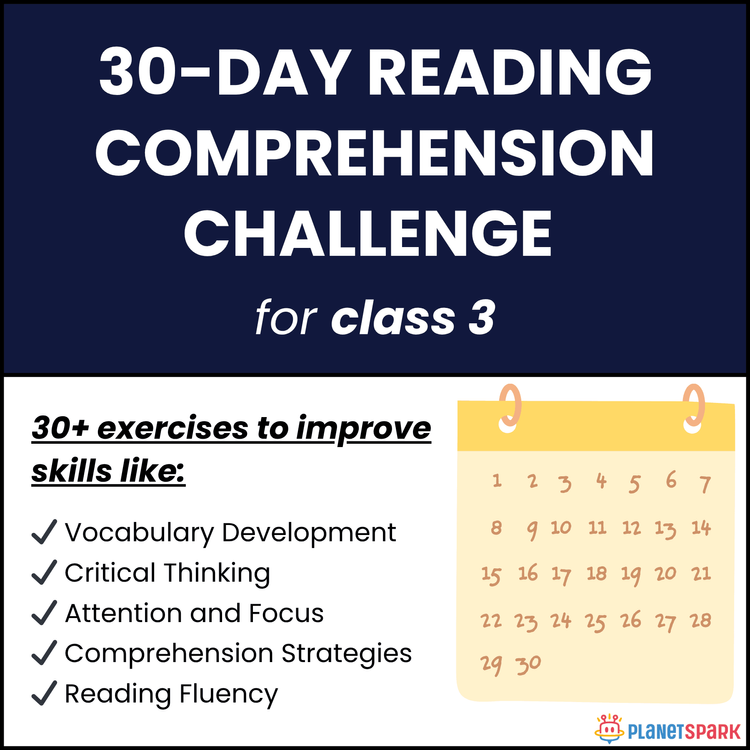Brain Development in Children: Proven Ways to Boost Brain Power

Table of Contents
- Understanding Brain Development in Children
- Importance of Boosting Brain Power in Kids
- 15 Proven Ways to Boost Brain Power in Children
- Role of Parents in Early Childhood Brain Development
- Foods for Brain Development in Children
- Fun Brain Exercises for Kids
- Long-Term Benefits of Boosting Brain Power in Kids
- The Role of Play in Brain Development
- How Music Influences Brain Development
- The Link Between Outdoor Activities and Cognitive Growth
- Creative Writing Courses for Kids at PlanetSpark
- Frequently Asked Questions (FAQs)
The early years are crucial for brain development in children. From birth to adolescence, the brain grows rapidly, forming connections that shape learning, behavior, and emotional health for life. Parents can play a vital role in nurturing this growth through the right nutrition, stimulating activities, and supportive environments. In this guide, we’ll explore proven ways to boost brain power in kids, including healthy foods, fun exercises, and habits that improve focus, memory, and creativity.
Boost your child’s brain power and communication skills.
Understanding Brain Development in Children
From the moment a child is born, their brain begins developing trillions of neural connections. By age three, a child’s brain is about 80% of its adult size. This rapid growth period is critical for cognitive, emotional, and motor skills. Early experiences, both positive and negative, strongly influence these pathways.
Several elements shape a child’s brain development, including:
Nutrition – Balanced meals rich in essential nutrients.
Stimulation – Activities and interactions that challenge the brain.
Environment – A safe, loving, and supportive home.
Sleep – Adequate rest for memory consolidation.
Importance of Boosting Brain Power in Kids
15 Proven Ways to Boost Brain Power in Children
1. Provide Nutrient-Rich Foods
Nutrition is the foundation of cognitive development in children. Key foods for brain development in children include:
Fatty fish – Rich in omega-3 fatty acids for memory and learning.
Eggs – Contain choline, which supports brain cell communication.
Nuts & seeds – Packed with antioxidants and healthy fats.
Berries – Improve memory with flavonoids.
Whole grains – Provide steady energy for the brain.
2. Encourage Reading
Reading stimulates imagination, expands vocabulary, and strengthens brain connections. Start early with picture books, then progress to stories and educational material.
3. Engage in Brain Exercises for Kids
Puzzles, memory games, Sudoku, and chess are excellent activities to improve brain power. These activities enhance logical thinking, problem-solving, and focus.
4. Promote Physical Activity
Regular exercise increases blood flow to the brain, boosting mood and cognitive performance. Activities like swimming, cycling, and team sports are great for children.
5. Limit Screen Time
Excessive screen time can affect attention span and social skills. Encourage more face-to-face interactions and outdoor play.
6. Ensure Quality Sleep
Sleep is essential for memory consolidation and emotional regulation. School-age children need 9–12 hours of sleep each night.
Help your child think smarter and speak confidently.
7. Foster Creativity
Art, music, and storytelling spark creativity, helping children think outside the box and make unique connections between ideas.
8. Teach Mindfulness and Meditation
Simple breathing exercises or guided meditations improve concentration, emotional control, and stress management.
9. Encourage Curiosity
Answering your child’s “why” questions and letting them explore their interests strengthens critical thinking.
10. Support Social Interaction
Playdates, group activities, and team projects help children develop empathy, cooperation, and communication skills.
11. Use Positive Reinforcement
Praising effort rather than results builds motivation and resilience.
12. Create a Learning-Friendly Environment
A quiet, organized study space without distractions enhances focus and learning efficiency.
13. Practice Memory-Building Games
Matching cards, storytelling, and sequencing activities improve memory retention.
14. Introduce Music
Learning to play an instrument improves coordination, listening skills, and brain connectivity.
15. Balance Work and Play
Role of Parents in Early Childhood Brain Development
Parents serve as the first teachers in a child’s life. Talking to your child, reading with them, and encouraging open communication create a secure base for exploration and learning.
Foods for Brain Development in Children
Essential Nutrients for Brain Health
Omega-3 fatty acids – Improve memory and learning ability.
Iron – Supports oxygen flow to the brain.
Zinc – Helps nerve signaling.
Vitamin E – Protects brain cells from damage.
Daily Meal Plan Example
Breakfast: Whole grain toast with eggs and fruit.
Lunch: Brown rice with vegetables and grilled chicken.
Snack: Nuts, seeds, and yogurt.
Dinner: Fish curry with whole wheat chapati.
Build your child’s memory, focus, and creativity.
Fun Brain Exercises for Kids
Memory Tray Game – Show a tray of items, cover it, and ask your child to recall them.
Story Building – Create a story together, one sentence at a time.
Maze Challenges – Improves problem-solving and spatial awareness.
Long-Term Benefits of Boosting Brain Power in Kids
Children who receive consistent support in brain development tend to:
Excel academically.
Show strong emotional intelligence.
Demonstrate better problem-solving skills.
Adapt quickly to new situations.
The Role of Play in Brain Development
Play is more than just fun, it’s an essential part of brain development in children. When kids engage in unstructured play, they use imagination, problem-solving skills, and social abilities without even realizing it. Activities like building blocks, pretend play, and outdoor games help children explore cause-and-effect relationships, develop motor coordination, and learn teamwork.
Research shows that free play stimulates the prefrontal cortex, the part of the brain responsible for decision-making, focus, and regulating emotions. Games that require planning, like board games or treasure hunts, strengthen logical thinking. Physical play, such as climbing or running, supports balance and spatial awareness, while imaginative play fosters creativity and emotional understanding.
Parents can encourage healthy brain growth by balancing structured learning with ample free play time. Even 30–60 minutes a day of active, self-directed play can make a big difference. Avoid over-scheduling children with constant classes and give them space to invent their own games and scenarios. This combination of physical, cognitive, and emotional stimulation lays the foundation for a well-rounded, adaptable brain.
Strengthen brain growth and public speaking ability.
How Music Influences Brain Development
Music is a universal language, and for children, it’s also a powerful brain booster. Learning to play an instrument or even engaging in regular singing can enhance memory, coordination, and listening skills. Studies have shown that musical training strengthens neural connections between the brain’s hemispheres, improving both analytical and creative abilities.
For younger kids, songs with actions (like clapping or dancing) support motor skills and rhythm recognition. For older children, learning an instrument like the piano, guitar, or violin boosts discipline, patience, and problem-solving. Even listening to different types of music exposes children to new patterns, improving auditory processing and focus.
Music also impacts emotional development. Singing or playing in a group builds confidence and teamwork, while composing or improvising encourages self-expression. Parents can introduce music into daily routines, playing background music during study time, singing lullabies, or encouraging dance sessions at home.
Combining music with other activities, like storytelling or movement games, multiplies its benefits. For example, creating a song about the day’s events can help with memory recall while keeping learning fun. In short, music nurtures both sides of the brain, making it a valuable tool for boosting brain power in kids.
The Link Between Outdoor Activities and Cognitive Growth
Spending time outdoors isn’t just good for physical health, it’s also vital for mental growth. Exposure to natural environments stimulates curiosity, observation skills, and problem-solving. Whether it’s a nature walk, gardening, or simply playing in the park, outdoor activities activate multiple senses, creating richer learning experiences.
Sunlight exposure boosts Vitamin D levels, which are essential for healthy brain function. Physical activities like cycling, running, or climbing enhance coordination, balance, and reaction time. Moreover, being in nature reduces stress hormones, improving focus and mood, both of which are important for learning.
Outdoor play also encourages risk assessment and decision-making. For instance, when a child climbs a tree or crosses a small stream, they evaluate safety and plan movements, enhancing their executive function skills. Group activities like team sports or nature scavenger hunts promote cooperation, communication, and leadership.
Parents can make outdoor learning more enriching by asking open-ended questions during these activities, such as, “Why do you think this plant grows here?” or “How can we find our way back without a map?” This kind of guided exploration combines fun with cognitive skill-building, creating a healthy balance between physical and mental development.

Creative Writing Courses for Kids at PlanetSpark
Brain development in children is not just about memory and problem-solving, it’s also about expressing ideas creatively. That’s where PlanetSpark’s Creative Writing Course comes in. Creative writing builds imagination, vocabulary, and communication skills, all of which boost cognitive growth.
How Creative Writing Supports Brain Power
When children write stories or poems, they practice organizing thoughts, developing plots, and expressing emotions. This strengthens:
Critical thinking – Planning and solving story challenges.
Language skills – Expanding vocabulary and grammar.
Emotional intelligence – Understanding different perspectives.
Focus and memory – Remembering details and connecting ideas.
What PlanetSpark Offers
PlanetSpark’s program is interactive and tailored for kids. It covers:
Story structure and character creation.
Poetry and descriptive writing.
Fun challenges, prompts, and contests.
Experienced trainers guide children through engaging lessons, provide personalized feedback, and track progress.
Why It Works
Creative writing is a mental workout that strengthens both sides of the brain. It fuels imagination while improving logical organization, helping kids excel academically and socially.
If you want your child to think creatively, communicate confidently, and sharpen their mind, PlanetSpark’s Creative Writing Course is the perfect choice.
Book a free demo today and unlock your child’s creative potential!
Frequently Asked Questions (FAQs)
1. What is the most important factor in brain development in children?
Nutrition, stimulation through activities, and a supportive environment are all crucial. A balance of these factors ensures healthy brain growth.
2. At what age does brain development peak in children?
The brain grows rapidly in the first five years, with major developments continuing into the teenage years. Early childhood is the most critical phase.
3. Which foods are best for brain development in children?
Fatty fish, eggs, nuts, seeds, berries, and whole grains are among the top brain-boosting foods for kids.
4. Can creative activities improve brain power in kids?
Yes. Activities like art, storytelling, and creative writing enhance cognitive skills, critical thinking, and imagination, boosting brain performance.
5. How does PlanetSpark’s Creative Writing Course help in brain development?
It engages children in structured storytelling, poetry, and expression, which improve language, memory, and creativity, all key aspects of brain growth.
6. What age group can join PlanetSpark’s Creative Writing Course?
PlanetSpark offers programs for kids aged 3–14, tailored to their skill levels and learning pace.
7. How are PlanetSpark classes conducted?
All classes are live, interactive sessions conducted online by trained educators, ensuring personalized attention and real-time feedback.
Download Free Worksheets
Personalized Communication Report
Record a video to get a AI generated personalized communication report for your child



